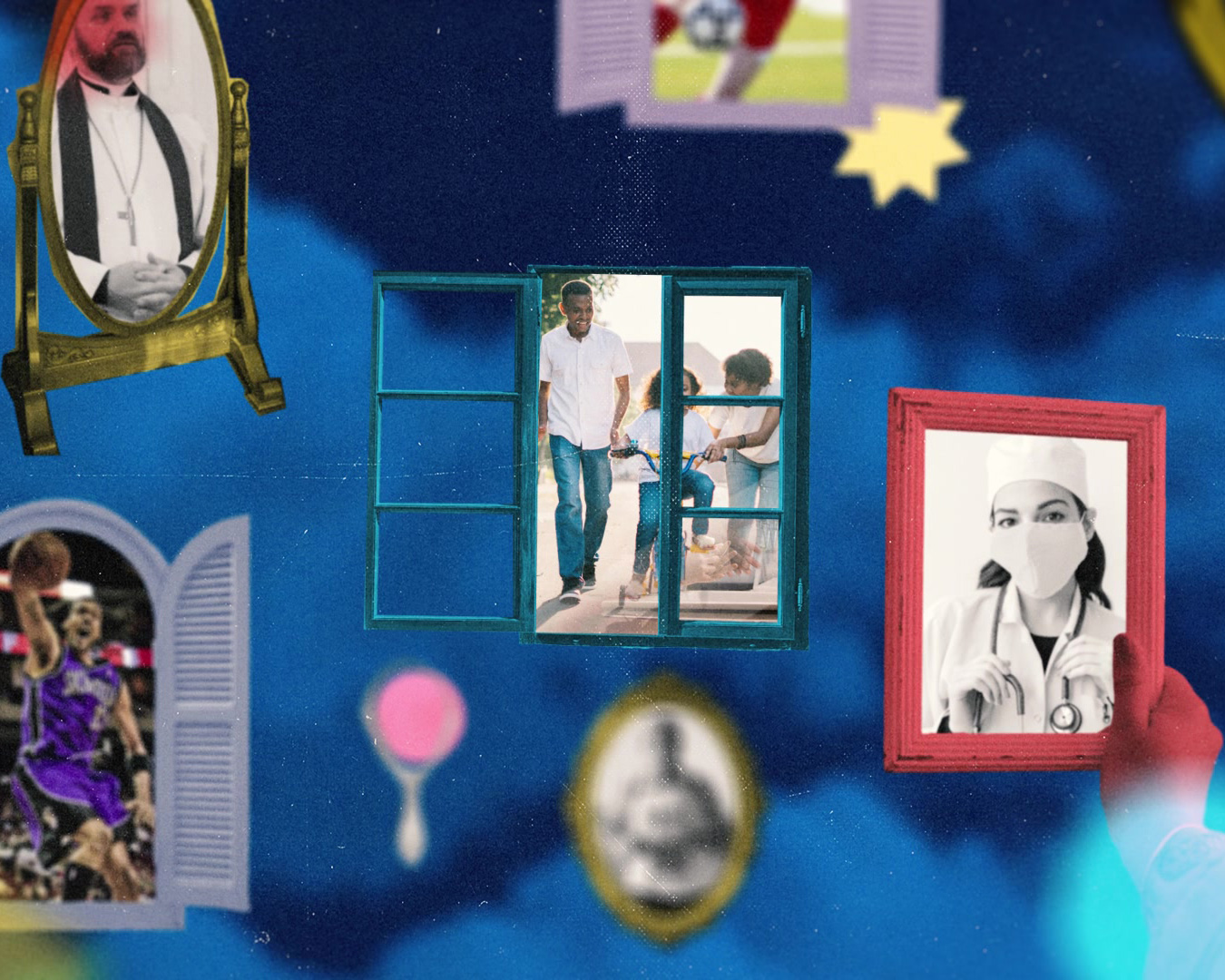Proclamation
Who are the best role models?

Your life matters. Your decisions matter. Your actions matter. Each of us is called to a life of holiness; you’re called to be a saint.
Proclamation

Explanation

Podcast

Edmund: Hey. Have you ever been in the city and you see some of these like Memorial things, it has a ton of names all over it. Whenever I walk by one of these, I always, I see all of these names and I always think one name. If you just like, put your finger on one of these names, what’s the impact of one life?
Like, there’s a whole long, big story behind this one person and every life has an impact. Can it hear me? Yeah. Food. What’s the impact? Think about your calories.
Oh, it’s so hot. Here we are in the big apple: Fort Worth, Texas. So, I mean, if you think about the impact of one life and the impact of one life can be not just on the people around that person, but even further than that. Let me tell you about one on August 26th, 1910, there was a little girl that was born and what’s now north Macedonia. And this little girl when she was younger, was fascinated by these stories of missionaries who had lived lives of service in Bengal. By age 12, she was convinced that she was gonna commit her life to religious life and the life of a missionary. Now this young girl who is so influenced and impacted by missionary work grew up to later founded the Missionaries of Charity, a religious organization of women who commit their lives to four vows, chastity, poverty, obedience, and a fourth vow: wholehearted, free service to the poorest of the poor.
Mother Teresa: The poor are great people. They give us much more than we give to them. We must love them. Not by feeling pity for them. We must love them because it is Jesus and the distressing disguise of the poor.
Edmund: See Mother Teresa was impacted by these missionaries and she herself became a missionary, but her life and her witness impacted so many more people than just the people she was serving directly. I mean, the story of her life had a far reaching effect. Mother Teresa and the Missionaries of Charity had such a huge impact in India, but their acts of charity went so much further than the people they were directly helping. Mother Teresa’s life impacted people on the other side of the world, even years after her life. Mother Teresa’s witness impacted the wider Church in unexpected ways.
Where am I? Okay. I might, I might actually be lost.
Austin: Okay. Sure, sure. Okay. Hi, my name is Austin Wybel. I am a co-founder of Prodigal Projects and Feast Day. So I grew up in like a small, uh, Christian conservative town. And so, you know, every Sunday and Wednesday, it was kind of understood, like Sunday was church, Wednesday was like CCD. Many of those lesson plans were around the lives of the saints as models and examples for how we can live. And Mother Teresa was definitely like a big point of emphasis. You know, at the time there was also very prominent and well known around like the secular world and you know, same in the Catholic world. And so that would’ve been like the time that I was exposed to her and her ministries. I guess the thing that stood out to me most was like, oh, she’s a modern day Saint. And that was of interest that, you know, I’m so used to, you read about a Saint or you choose like a confirmation Saint, for example, and it’s generally like they were born in the ninth century or they were a Desert Father. Okay, yeah. How do I relate to this person? But this was, you know, Mother Teresa is someone who lived in the modern world with all of its distractions and false glory and chose otherwise. And so that was inspirational in that, uh, we could have intertwined and, and similar struggles, what I thought was inspiring about her ministry and what she did in Calcutta, um, which she never tried to be one thing for one person. She definitely, you know, spread her ministries across that area and to different people and to serve, you know, the young, the poor, the sick, the healthy, everybody needed that level of service, um, and love and dignity. And I thought that was really cool. And then as time went on and her ministry grew and popularity grew, she started receiving all of these people coming to Calcutta to serve with her and under her.
And I just remember in one interview, you know, her kind of saying like, first of all, she loved it. You know, thank you for being here. Thank you for wanting to serve. But in the same breath was also like go home and sweep your own doorstep, but there might not be severe poverty in Coppell, Texas the same way there is severe poverty in Calcutta, but there is like a poor of spirit and there is work to be done here. So find it, you know, and it first starts in yourself and then your household and then your community. Prodigal Projects was originally created as like an, is just kind of like an umbrella to capture a feeling which is, uh, “what can we be doing to help preserve and restore dignity to people?” The obvious need was, uh, those experiencing homelessness, uh, when you’re living on the streets for weeks, years or decades on end, people tend to not look at you the same.
So the dignity that you once had has felt stripped away. And so we wanted to restore it. And so that’s when we came up with the idea for Feast Day, which is essentially the opportunity to do a, um, a restaurant style dining experience for people that are experiencing homelessness. And we would open the doors and, you know, serve, you know, anywhere between 50 and 200 individuals off the streets, uh, in various life situations. And we’d bring in volunteers and professional chefs. And the way we chose to restore dignity was to treat everybody like it was a restaurant experience with real plates and real silverware and glassware, choices on a menu, and then all seated together. You know, you would sit together, volunteer and guest, and you’d be able to have conversation and talk about anything from sports to politics, to religion, to their stories. Feast days were incredibly joyful nights. Um, so that was our moment of restoring dignity. And that’s what Feast Day stood for. I think the beauty of having a Communion of Saints is that they’re actively praying for me and for you to achieve at that same level.
Edmund: Okay. So in the creed, you’ve heard of the creed, right? The Apostles creed? We say that we believe in the Communion of Saints. It says in the Catechism in paragraph 961, that “the term, the “communion of saints” refers to the communion of “holy persons” in Christ “who died for all,” so that what each one does or suffers in and for Christ bears fruit for all.” I mean, these were normal people just like me and you who were inspired by the lives of saints to become saints who now we can read about as saints so that we can become saint. I mean, it’s a lot of saints, a lot of saint action, and it is possible with Jesus’ help to lead a saintly life. We can be saints, you can be a Saint. And so we continue to ask the intercession of the saints, all the holy men and women to pray for us.
U.41 — CCC 2759-2806

Let the words of the Lord’s Prayer fill your heart, mind, and soul as you grow closer to God as Our Father.
WatchU.40 — CCC 2697-2758

Learn from Jesus’ example of stepping away to pray, and explore how you can create your own “daily monastery” for prayer and reflection.
WatchU.39 — CCC 2650-2696

The Catechism reminds us that while we can’t control the Holy Spirit, we can prepare our hearts and minds for prayer by relying on the Church’s “wellsprings” of prayer.
WatchU.38 — CCC 2568-2649

The Psalms encompass all five types of prayer—blessing, praise, petition, intercession, and thanksgiving—guiding us to speak to God with honesty and depth.
WatchBy submitting this form you consent to receive emails about Real+True and other projects of OSV.